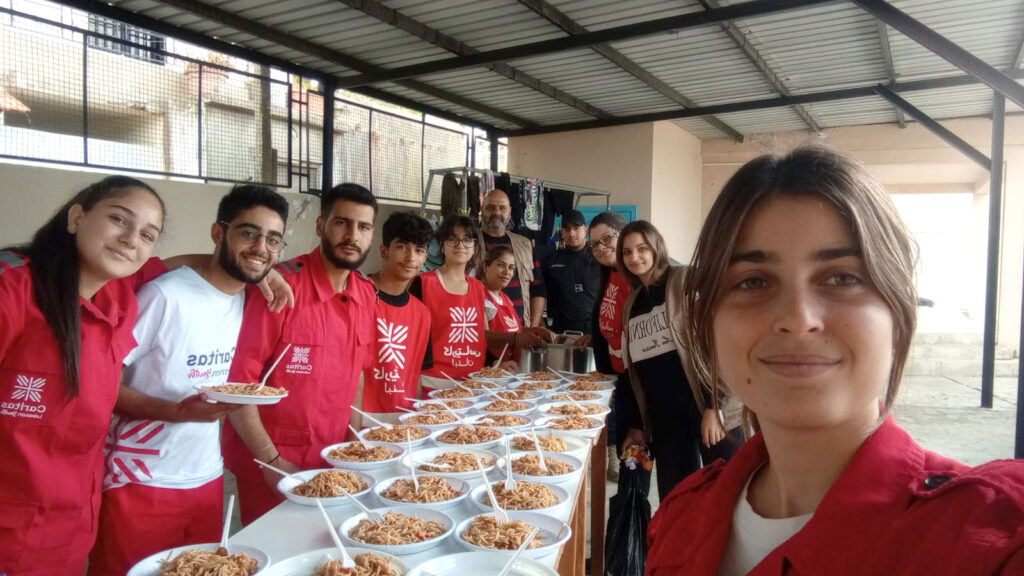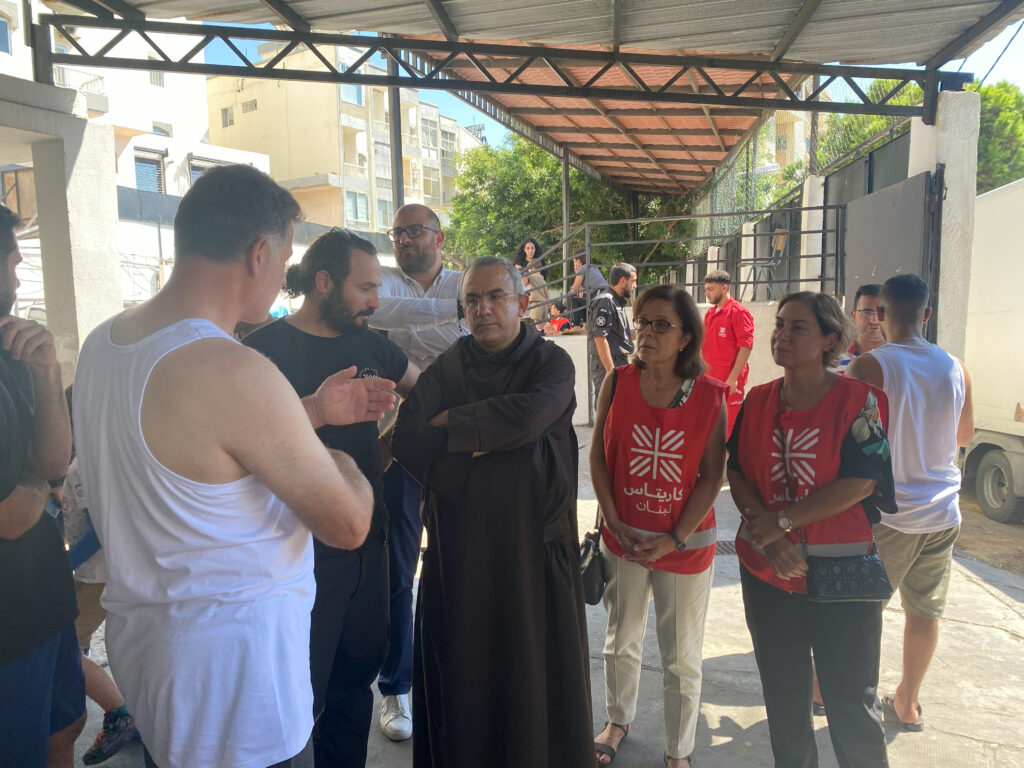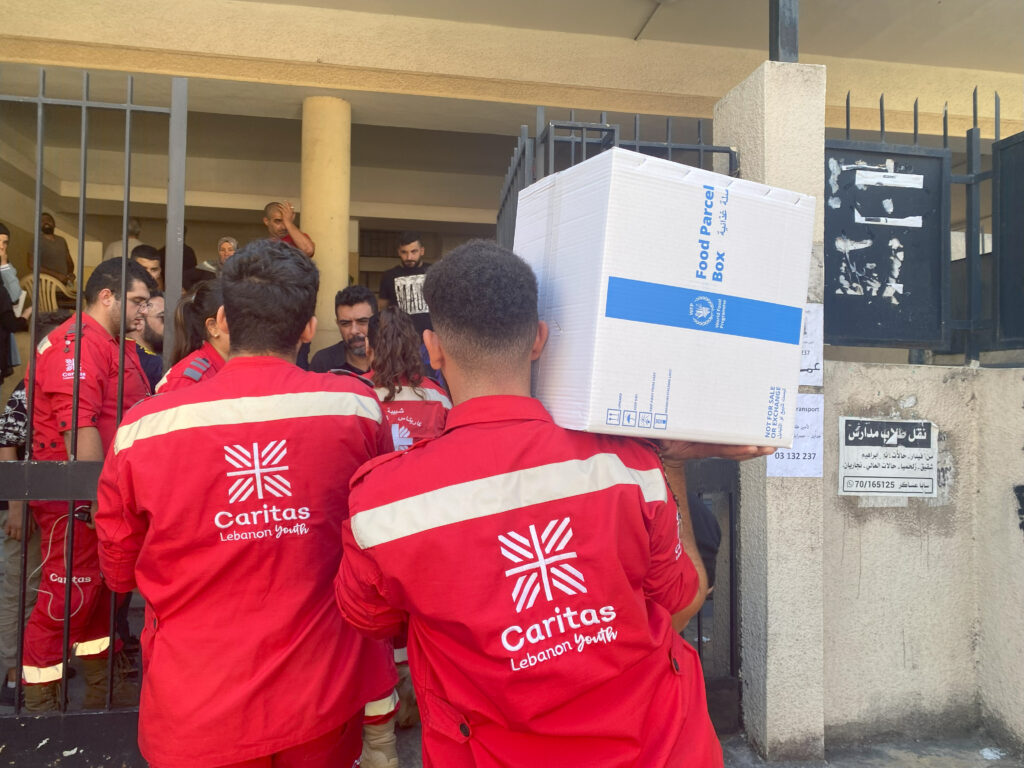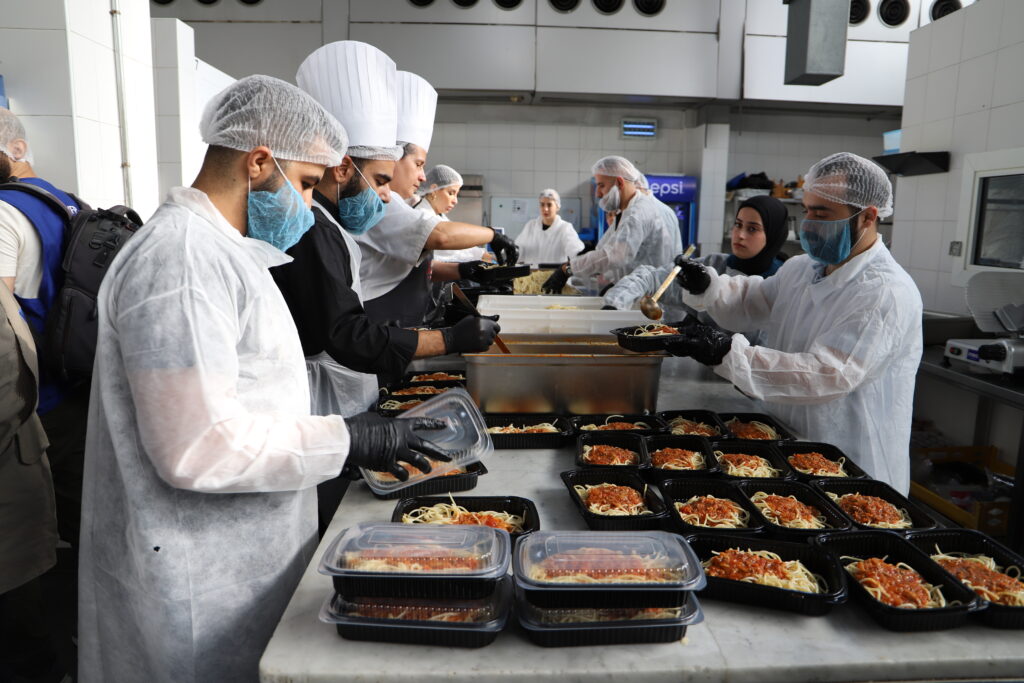Cordaid is responding to a daunting crisis, both in Gaza and now also in Lebanon, where we support Caritas aid workers in their efforts to address surging humanitarian needs. From Beirut, Fr. Michel Abboud, President of Caritas Lebanon, reports: “Whatever the challenges, we remain committed to reach out.”

Photograph: Caritas Lebanon
When describing what he sees from his office windows in Beirut, Fr Michel gives a chilling account. “The bombing is happening right before our eyes. Every day. We know, with each explosion, that citizens are going through hell. Not in the hereafter, but here, on earth.”
The overall feeling of insecurity throughout the city, even the country as a whole, is acute. “Some areas might get last minute warnings to evacuate, but the truth is that people don’t know where or when the bombs will be dropped”, he says.
“The people of Lebanon are tired, wounded and desperate.”
“People just want the madness to stop”
Before expanding on the humanitarian response activities of Caritas Lebanon to this current wave of destruction, Fr. Michel takes us back in time. “You have to remember that before the current affliction, Lebanon already carried a heavy burden. More than half of Lebanon’s 6 million people live below the poverty line. Still, the country welcomed, hosted and supported an estimated 1,5 million Syrian refugees. Our spirit of hospitality stretches far. But Lebanon’s shoulders can only carry that much. The fact that tens of thousands of Syrian refugees are now fleeing Israel’s attacks back into Syria, is just one of many cruel illustrations of this inferno.”
Fr. Michel (50) is part of what he calls ‘the generation of bloodshed’. He has seen it all, many times before. Like any middle-aged person in the country, he has lived through the gruesome 1975-1990 period of invasions and civil war. And the invasions and attacks that followed.
Is today’s war comparable to previous ones? “Maybe slightly to the Israel-Hezbollah war of 2006”, Abboud says. “With this crucial difference, that back in 2006 Lebanon’s economy was stronger. Today, communities are so poor they can hardly provide for themselves, let alone for the many who are displaced. And this war hits us harder.”

Photograph: Caritas Lebanon
“The people of Lebanon”, he continues, “are tired, wounded and desperate. For decades, their houses were demolished, their loved ones killed, their meagre savings stolen. People are tired, extremely tired, of wars that are not theirs. They just want the madness to stop.”
In the current escalation, the humanitarian crisis in Lebanon is rapidly unfolding. According to Caritas Lebanon, more than 2300 people have been killed and over 10.000 people have been wounded since October 2023. An estimated one million people are forcibly displaced.

Photograph: Caritas Lebanon
Delivering aid throughout the country
Long before October 2023, Caritas Lebanon, with its 89 support centres, 660 staff and 3000 voluntary workers, had already been delivering critical aid and support throughout the country. Ever since October 2023, they ramped up their relief operations as much as means possibly allowed.
When things escalated, Caritas Lebanon immediately set up a hotline, making it easier for conflict-affected citizens and refugees to access their services. These services cover a wide spectrum of life saving assistance.
Ten primary healthcare centers and 9 mobile medical units respond to soaring medical needs and continue to operate in the direst of circumstances, for example in the badly hit southern part of Lebanon.
In 35 social centers, staff is working around the clock to provide hot meals, hygiene and winterization items, as well as clothes and toys for kids. There are Caritas Lebanon safe houses for women and children survivors of GBV and human trafficking, providing humanitarian, social, psychological and legal support.
Caritas Lebanon has provided and continues to provide similar forms of assistance and protection across the country to hundreds of thousands of refugees and migrants, especially from Syria, Iraq and Palestine.
“We are all dealing with severe insecurity. Some of our staff and volunteers, especially in the South, are displaced themselves.”
Increasing risks, growing needs
Now that the country is turning into a warzone, providing these services comes with increasing risks. While needs are growing.
“We are all dealing with severe insecurity. Some of our staff and volunteers, especially in the South, are displaced themselves. Humanitarian access, logistics, mobility are all increasingly problematic. Sometimes access is denied, sometimes we can only reach crisis areas by taking extreme precautionary measures. The last time I was in the south, visiting our mobile clinics near the border in September, villagers there had already received summons to leave. Some left. Some stayed. They had no place to go, were too poor, too sick or too old, or did not want to leave their native land, their home, their animals. Last I heard, a small group had settled around the church with the priest who had also decided to stay.”

Photograph: Caritas Lebanon
“We pray for support and solidarity”
When asked about the near future, while explosions continue to pound the city of Beirut not far from his office, Father Abboud is unambiguous. “This brutal war will not stop soon. The destruction, suffering and despair will continue. The cold will soon set in. Circumstances for the displaced, both in formal and informal camps, will deteriorate. Viral outbreaks are lurking, kids keep missing out on school and suicide rates are rising.”
Yet, in these dark times, Father Abboud’s faith is a source of hope. And action. “Every single one of us is committed, prepared and skilled to act and to reach out. Our mobile medical units are on call. Our centres are there to feed, to heal and to care. As long as we can. But finances are dwindling. Even before this current war started we had a hard time meeting humanitarian demands. So we pray for support and solidarity with Lebanon. Meanwhile, we continue to stay on call. Today, in times of war and emergency, and later, when the bombings will have stopped and we can address the deeper wounds of war.”
To learn more about the national fundraising campaign in the Netherlands and find out how you can help, please visit: Giro555 (Samen in Actie voor Slachtoffers Conflict Midden-Oosten)